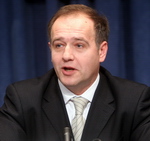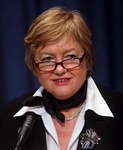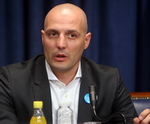- Serbia
Get to know Serbia
- Citizens
Culture and science
Health services
Pension and disability insurance
- Business
Employment
Economy
- Media
- Government
- Contact
Keep in touch
Contact form
Back
Keepin touch
Whether you have a question, comment, suggestion or any problem in the purview of the government, send us your message and we will try to respond as soon as possible. If your problem is not in our purview, we will forward your message to the relevant institution.
Q:
A:
Certificates granted to 26 schools that completed “School without Violence” programme
Belgrade,
26 February 2008
Serbian Minister of Education Zoran Loncar stated today that around 10% of schools, or more precisely 101 schools, 6,770 teachers and 71,113 students, got involved in the “School without Violence” programme.
Loncar told a press conference that certificates were given to representatives of 26 schools that completed this programme and added that funds to include another eleven schools were provided by Elektroprivreda Srbije.
He also said that security in schools is not satisfactory and pointed out that to reduce the violence the state should take systematic measures.
Increasing security levels and reducing violence should be among the top priorities for the state and therefore comprehensive action by various state organs is needed; the Ministry of Education as well as other ministries, including the Ministry of Interior, he explained.
Loncar also mentioned that the Ministry recently created a Protocol on the protection of children from violence.
He also said that security in schools is not satisfactory and pointed out that to reduce the violence the state should take systematic measures.
Increasing security levels and reducing violence should be among the top priorities for the state and therefore comprehensive action by various state organs is needed; the Ministry of Education as well as other ministries, including the Ministry of Interior, he explained.
Loncar also mentioned that the Ministry recently created a Protocol on the protection of children from violence.
UNICEF Area Representative to Serbia Judita Reichenberg said that the experiences of other countries showed that three years is not enough to visibly reduce violence in schools and added that results can be seen after one generation is taught against violence during their education.
She said that according to 2006 research, 65% of Serbian students were at least once in three months exposed to peer violence whereas it is alarming that 32% of students had problems with violent behaviour by teachers.
UNICEF National Ambassador to Serbia and promoter of the “School without Violence“ programme Aleksandar Djordjevic said that it is very important that children from their childhood know true values and only in that way can a better future for Serbia be created.
She said that according to 2006 research, 65% of Serbian students were at least once in three months exposed to peer violence whereas it is alarming that 32% of students had problems with violent behaviour by teachers.
UNICEF National Ambassador to Serbia and promoter of the “School without Violence“ programme Aleksandar Djordjevic said that it is very important that children from their childhood know true values and only in that way can a better future for Serbia be created.
He noted that children need to know that they must not tolerate violence and that they should not respond to violence by using violence.
The programme titled “School without Violence – Towards a Safe and Enabling Environment for Children” has been implemented in Serbia since September 2005 by UNICEF, Ministry of Education, Ministry of Labour and Social Policy, Ministry of Health and other institutions.
The programme is being financed with voluntary contributions from citizens and the corporate sector. So far over 50,000 individuals and nearly 1,000 companies have supported the programme.
The programme titled “School without Violence – Towards a Safe and Enabling Environment for Children” has been implemented in Serbia since September 2005 by UNICEF, Ministry of Education, Ministry of Labour and Social Policy, Ministry of Health and other institutions.
The programme is being financed with voluntary contributions from citizens and the corporate sector. So far over 50,000 individuals and nearly 1,000 companies have supported the programme.
-
 Belgrade, 22 January 2025
Belgrade, 22 January 2025Egypt one of Serbia’s closest partners on international stage
-
 Belgrade, 9 July 2024
Belgrade, 9 July 2024Support for 104 associations in diaspora that preserve Serbian language, culture
-
 Belgrade, 15 April 2024
Belgrade, 15 April 2024Competition for StarTech grants open until 31 May
-
 Belgrade, 2 October 2023
Belgrade, 2 October 2023Serbia respects Resolution 1244 and will do everything to preserve peace
-
 Belgrade, 13 September 2023
Belgrade, 13 September 2023Day of Serbian Unity to be celebrated outside borders of Serbia, Republika Srpska for the first time
-
 Belgrade, 8 August 2023
Belgrade, 8 August 2023RSD 24.2m in state aid paid out to citizens affected by storm
-
 Belgrade, 17 June 2023
Belgrade, 17 June 2023Belgrade is doing everything to preserve peace in Kosovo and Metohija
-
 Belgrade, 15 June 2023
Belgrade, 15 June 2023Slovenia will continue to support Serbia on its way to EU
-
 Belgrade, 5 May 2023
Belgrade, 5 May 2023Emergency measures, tightening of conditions for possessing weapons
-
 Belgrade, 3 May 2023
Belgrade, 3 May 2023Three days of mourning in Serbia over tragedy at Vladislav Ribnikar primary school



